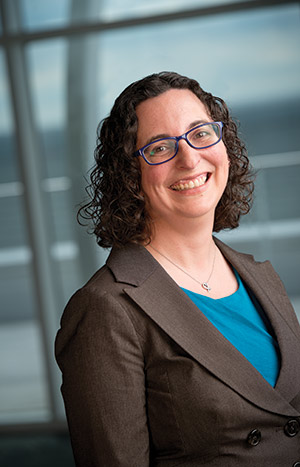Sette dedicated to court system’s most vulnerable
By: Erika Strebel, [email protected]//June 7, 2017//
Sette dedicated to court system’s most vulnerable
By: Erika Strebel, [email protected]//June 7, 2017//

Laura Sette went to law school to be a prosecutor. Instead, she became a public defender in Brooklyn after graduation before coming to Wisconsin.
She found her true calling when she started working for the Legal Assistance to Institutionalized Persons clinical program at the University of Wisconsin Law School.
“I was scared to death to do the program,” she said. “I ended up loving it. The clients I met were amazing.”
One big reason Sette’s fears proved ill-founded was her background. Before going to law school, Sette managed group homes that cared for people with disabilities and mental illnesses. She also worked on afterschool programming, which involved not just helping kids but also working on mental-health cases.
Sette says she doesn’t know why her interests gravitate toward those groups but remembers some eye-opening experiences that she had while working in high school Girl Scout camps as an undergraduate student. Some of the kids she liked working with came from the foster system.
“They were great kids and they had a lot of struggles,” Sette said. “It opened my eyes to a whole different area of working with kids.”
Sette says the part she enjoys most about her job is working and talking with clients.
But the work is not without its difficulties. Sette and her colleagues represent clients from when they come into the system until they leave it, which is usually when they reach 18. She said it can be hard watching them go.
“I’ve seen them through all sorts of changes. … We get very emotionally invested in our clients,” Sette said. “The hardest part is that emotional investment.”
One of Sette’s most notable achievements involved her work on a committee that developed a community garden program for juveniles who had violated a court order. Instead of spending time in shelter care, the kids worked an hour or two a week raising vegetables to give to a food pantry.
It took a year and a half to get the program running. In spite of that, the program served more than a dozen kids, whose work generated about 900 pounds of produce.
“I don’t think any of those kids have come back to court,” Sette said. “They’ve been doing really well in school. This year we’ve been given the money and are able to expand the program.”
Legal News
- Former law enforcement praise state’s response brief in Steven Avery case
- Eric Toney announces re-election bid for Fond du Lac County District Attorney
- Former Wisconsin Democratic Rep. Peter Barca announces new bid for Congress
- Republicans file lawsuit challenging Evers’s partial vetoes to literacy bill
- More human remains believed those of missing woman wash up on Milwaukee Co. beach
- Vice President Harris returning to Wisconsin for third visit this year
- Wisconsin joins Feds, dozens of states to hold airlines accountable for bad behavior
- Trump ahead of Biden in new Marquette poll
- Bankruptcy court approves Milwaukee Marriott Downtown ‘business as usual’ motion
- New Crime Gun Intelligence Center to launch in Chicago
- Arrest warrant proposed for Minocqua Brewing owner who filed Lawsuit against Town of Minocqua
- Wisconsin Supreme Court justices question how much power Legislature should have
WLJ People
- Power 30 Personal Injury Attorneys – Russell Nicolet
- Power 30 Personal Injury Attorneys – Benjamin Nicolet
- Power 30 Personal Injury Attorneys – Dustin T. Woehl
- Power 30 Personal Injury Attorneys – Katherine Metzger
- Power 30 Personal Injury Attorneys – Joseph Ryan
- Power 30 Personal Injury Attorneys – James M. Ryan
- Power 30 Personal Injury Attorneys – Dana Wachs
- Power 30 Personal Injury Attorneys – Mark L. Thomsen
- Power 30 Personal Injury Attorneys – Matthew Lein
- Power 30 Personal Injury Attorneys – Jeffrey A. Pitman
- Power 30 Personal Injury Attorneys – William Pemberton
- Power 30 Personal Injury Attorneys – Howard S. Sicula











